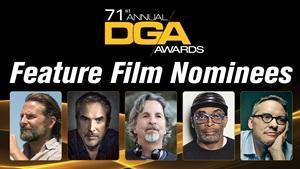Last year,'s Greta Gerwig became just the 8th woman nominated by the Directors Guild of America for its Best Feature Film Director award since 1948. This year, well, if they could have somehow nominated Lady Bird again maybe they would have done so, but instead it's a return to another "all-male nominees" line-up, the bane of Natalie Portman's existence.
As per usual, if you directed a movie which has a good shot at winning Best Picture at the Oscars you're up for a DGA award as well. This year, that list includes: Bradley Cooper ( A Star is Born), Alfonso Cuaron ( Roma), Peter Farrelly ( Green Book), Spike Lee ( BlacKkKlansman), and Adam McKay ( Vice).

Which, fine. Whatever. Anyone who has been paying attention to the curious whims of awards season shouldn't be too surprised, and at least three of those directors - Cooper, Cuaron, Lee - produced films I personally adore. It's an obvious oversight that neither Debra Granik's work on Leave No Trace nor Lynne Ramsey's masterful crafting of You Were Never Really Here apparently registered with DGA voters, but outside of the Indie Spirit Awards neither film has had any real momentum in the form of notable nominations from the awards bodies thought to be most predictive of the Oscars.
It's still a bit of a mystery as to why that it is exactly - bad timing? lack of effort by the involved studios? not enough ass-kissing of prospective voters? - but it has undeniably been the case. Thus, the DGA is mostly just going with the flow here. That's not to let them off the hook, more to explain why this isn't surprising.
The DGA, however, has other film awards. There's also the First-Time Feature Film Director award, which was created in 2015 and counted directors Marielle Heller ( The Diary of a Teenage Girl) and Kelly Fremon Craig ( The Edge of Seventeen) among its nominees during its first two years of existence. Since then, "all-male nominees," including this year's Bo Burnham ( Eighth Grade), Carlos Lopez Estrada ( Blindspotting), Matthew Heineman ( A Private War), Boots Riley ( Sorry to Bother You), and Cooper, who, remember, is a first-time director with A Star is Born.
The bright spot for those wishing to see more industry acknowledgment of directors who just happen to have two X chromosomes is the DGA's Documentary Director award, which was first established in 1991 and had already nominated 20 female directors by 1997. That is an area where women have a better shot of being recognized partially because labor statistics show that while there is only one female director for every 22 male directors on the feature side there is considerably more parity on the documentary side. As such, yes, this year the DGA's five nominated documentaries include one directed by women- Betsy West and Julie Cohen's RBG.
That's not good enough, at least if you go by the social media reaction yesterday when the nominations were announced:
This, of course, is entirely predictable. We live, as The Atlantic argued, in a state of perpetual outrage over just about anything these days, and on the list of offenders - well below the government shutdown but certainly above Kris Jenner losing her pixie cut - is whether or not movie awards are woke enough. Consecutive years of #OscarsSoWhite and #OscarsSoMale has guaranteed that, and it's a conversation which will recur until recognition of diverse nominees is normalized and not just an every-once-in-a-while aberration. For example, while it used to be rare for people of color to be nominated for Best Director it's become increasingly common in recent years, including this year's batch of DGA nominees. The same has obviously not yet happened for female directors.
Of course, as I argued last year you can't just rubber stamp diversity nominees because they fit a socially conscious quota for your awards show. The work has to warrant the recognition, but outside of critical circles, blogs, and annual top 10 lists wider recognition often doesn't come unless the work clicks with audiences enough to warrant the studios and their awards specialists throwing their resources into a possible Oscar (and all pre-Oscar awards) run.
Time and time again, when you listen to the awards experts employed by industry trades like THR and Variety they give considerably extra weight to those potential Oscar nominees who are made almost permanently available to Academy members at various screenings or meet-and-greet events. The work speaks for itself, sure, but it helps a lot if you have a solid media strategy and are damn charming while talking to voters whose membership guarantees them exclusive access to you. That takes time and money, with no guarantee of a return on investment.
To that point, the four female-directed feature films of 2018 which have translated critical acclaim into at least the darkest of dark horse Best Picture chances - Marielle Heller's Can You Ever Forgive Me? And Chloe Zhao's The Rideralong with the aforementioned Leave No Trace and You Were Never Really Here - grossed a combined $18.5m at the domestic box office. Keep in mind that's $18.5m in an age in which it's said to cost at least $25m in prints and advertising to even put a movie into wide release in theaters.
That kind of non-existent profit margin hasn't stopped small movies like Room or Spotlight from being supported enough for sustained awards season campaigns in the past, but look at how well that worked out for the company which distributed Spotlight, Open Road Films. It's essentially out of business now.
Of course, the catch 22 here is that in order for certain films to be recognized by an awards body they need to have made enough money to warrant an awards campaign but in order to make money they could really use the boost of awards recognition.
Not that this is trips up everyone. Blindspotting was seen by fewer people in theaters than Can You Ever Forgive Me? or Leave No Trace, yet Carlos Lopez Estrada still managed a First-Time Feature nomination, a very deserving nomination, I should add, and a surprising one considering the way his masterpiece of a film has gone almost completely ignored by all awards bodies to this point. Still, why could he crack that category but Mary Queen of Scot 's Josie Rourke could not, just as Heller and Granik couldn't crack the feature film category?
Because DGA voters simply liked those others films more. Duh.I guess. It always comes down to that, but it seems like the problem used to be there simply weren't enough female-directed films, period, and now the problem is getting the female-directed films which do exist to be taken more seriously. That's not technically true since according to the University of Southern California's Annenberg School for Communication and Journalism the number of female-directed films hasn't actually increased like we think it has, but our perception of the problem has changed because we are more aware of it now.
So, when movies like Leave No Trace, You Were Never Really Here, and The Rider arrive, are hailed as masterpieces in their own way, and then completely fail to get any major awards season traction it's all the more upsetting because voters obviously can't say there wasn't anything worth nominating. There just might not have been a female-directed film with enough money behind it or audience recognition, unlike Gerwig's Lady Bird, which caught lightning in a bottle and turned into the highest-grossing film in the history of its distributor, A24.
With that in mind, here are ten interesting 2018 films which happened to have been directed by a woman. They don't all deserve Best Director nominations, but they are all quality films (I swear, Kay Cannon's Blockers is far better than its trailer would indicate). Personally, I'm partial to Leave No Trace.
6 Balloons (Director: Marja-Lewis Ryan) Blockers (Director: Kay Cannon) Can You Ever Forgive Me? (Director: Marielle Heller) Leave No Trace (Director: Debra Granik) Mary Queen of Scots (Director: Josie Rourke) RBG (Directors: Betsy West and Julie Cohen) Revenge (Director: Coralie Fargeat) The Rider (Director: Chloe Zhao) To All the Boys I've Loved Before (Director: Susan Johnson) You Were Never Really Here (Director: Lynne Ramsay)
Grew up obsessing over movies and TV shows. Worked in a video store. Minored in film at college because my college didn't offer a film major. Worked in academia for a while. Have been freelance writing and running this blog since 2013. View all posts by Kelly Konda

